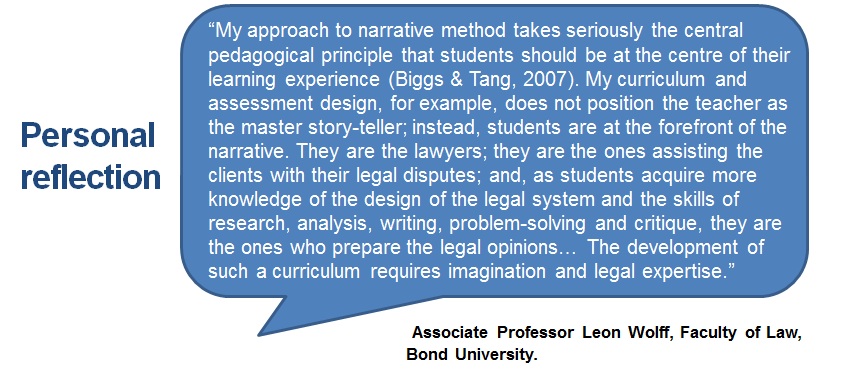Criterion 1
Exemplars
Criterion 1 | Design and planning of learning activities
Exemplar 1 – Associate Professor Leon Wolff, Faculty of Law, Bond University
Associate Professor Leon Wolff was awarded a Citation by the Australian Learning and Teaching Council for his innovative use of narrative methodology to create an authentic, inquiry based learning experience for first year law students. In his application for the award he reflects on how he developed curriculum and resources that reflect innovative design, a command of the discipline of law and pedagogical principles such as a student centred approach.
Wood, K. Knight, D, & Kinash, S (Eds.) (2012). Scholarship of teaching and learning @ Bond: Fostering early career research (Vol. 2). Queensland, Australia: Office of Teaching and Learning, Bond University, pp. 183-189
Exemplar 2 – Radical course revision: a case study
In this article Julie Stout reflects on how dissatisfaction with student performance and evaluations drove her to drastically revise a course. Although the original course design was based on active learning principles, she realised that there was a lack of alignment between the activities, theory and learning objectives because she had not clearly articulated the skills that she expected students to learn. Julie explains the course changes that she implemented and how they improved student learning and satisfaction as well as her own enjoyment in teaching the course.
Stout, J. (2001) Radical course revision: a case study. The National Teaching and Learning Forum, 10(4), 1-5.
Exemplar 3 – Physiotherapy Clinical Education Team (Jo Cannaughton, Susan Edgar & Jacqui Francis-Coad), Notre Dame University
The team were awarded a Citation by the Australian Learning and Teaching Council for the developing and scaffolding reflective practice skills in an online environment to promote independent work-ready graduates. In this excerpt from their award application, the team describe how they increased student motivation and engagement through the innovative development of an assessed framework.
Excerpt from teaching award application


